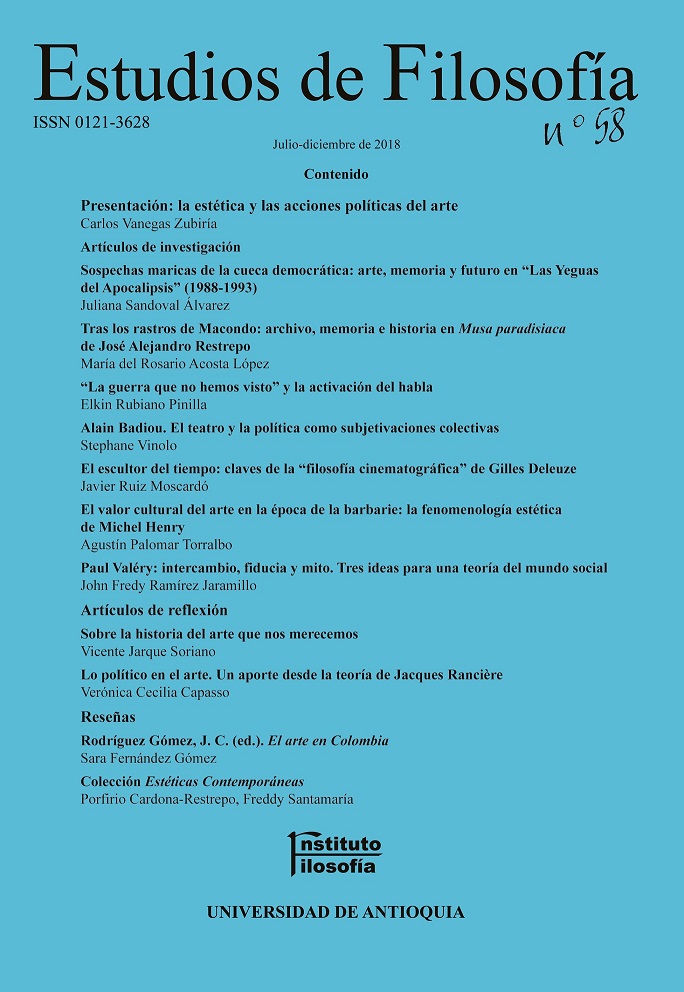The sculptor of time: some keys to Gilles Deleuze’s “cinematographic philosophy”
DOI:
https://doi.org/10.17533/udea.ef.n58a06Keywords:
Deleuze, philosophy of film, Bergson, nihilism, aestheticsAbstract
Gilles Deleuze has offered in his two studies on cinema —L’image–mouvement et L’image– temps— one of the most ambitious proposals of the last decades on the relation between philosophy and cinema, constructing a true “cinematographic philosophy” and inaugurating, in parallel to Stanley Cavell, a fruitful line of philosophical research that has been called “film–philosophy”. His first work focuses, essentially, on a metaphysics of time inspired by the philosophy of Henri Bergson, but using the possibilities of cinema to complement and transcend the ideas of the author of L’évolution créatice. In his second work, on the other hand, Deleuze analyzes film modernity, together with the new regime of images that it promotes, as a symptom of contemporary nihilism and in turn as a tool that can collaborate in its overcoming. We will try to make a general presentation of the keys of the Deleuzian approach, taking as a reference the following two axes: the conception of cinema as a true ontological model capable of allowing us to think of the time and the universe in a promising way, and the aptitudes of cinema as an ethical instance from which to oppose the dangers of contemporary nihilism.
Downloads
References
Álvarez Asiáin, E. (2011a). De Bergson a Deleuze: la ontología de la imagen cinematográfica. Eikasia: revista de filosofía, 41, 93–112.
Álvarez Asiáin, E. (2011b). La cuestión ética de la creencia en el mundo a través del cinematógrafo. Cuaderno de Materiales, 23, 5–23.
Bergson, H. (1963). Obras escogidas. Madrid: Aguilar.
Bogue, R. (2003). Deleuze on Cinema. New York & London: Routledge.
Carroll, N. (1988). Film/Mind Analogies: The Case of Hugo Munsterberg. The Journal of Aesthetics and Art Criticism, 46(4), 489–499.
Deleuze, G. (1984). La imagen–movimiento: estudios sobre cine 1. Barcelona: Paidós.
Deleuze, G. (1987). La imagen–tiempo: estudios sobre cine 2. Barcelona: Paidós.
Merrell, F. (1998). Introducción a la semiótica de C. S. Peirce. Maracaibo: Universidad del Zulia.
Rodowick, D. (1997). Gilles Deleuze’s Time Machine. Durham & London: Duke University Press.
Ruiz Moscardó, F. J. (2016). El kantismo de Hugo Munsterberg en los orígenes de la filosofía del cine. Contrastes: Revista Internacional de Filosofía, 21(2), 145–162.
Sinnerbrink,R. (2016). Cinematic Ethics:Exploring Ethical Experience through Film. New York & London: Routledge.
Turvey, M. (2008). Doubting Vision. Film and the Revelationist Tradition. Oxford: Oxford University Press.
Published
How to Cite
Issue
Section
Categories
License
Copyright (c) 2018 Javier Ruiz Moscardó

This work is licensed under a Creative Commons Attribution-NonCommercial-ShareAlike 4.0 International License.
Authors who publish with this journal agree to the following terms:
1. The Author retains copyright in the Work, where the term "Work" shall include all digital objects that may result in subsequent electronic publication or distribution.
2. Upon acceptance of the Work, the author shall grant to the Publisher the right of first publication of the Work.
3. The Author shall grant to the Publisher a nonexclusive perpetual right and license to publish, archive, and make accessible the Work in whole or in part in all forms of media now or hereafter known under a Creative Commons Attribution-NoCommercia-ShareAlike (CC BY-NC-SA 4.0), or its equivalent, which, for the avoidance of doubt, allows others to copy, distribute, and transmit the Work under the following conditions: (a) Attribution: Other users must attribute the Work in the manner specified by the author as indicated on the journal Web site;(b) Noncommercial: Other users (including Publisher) may not use this Work for commercial purposes;
4. The Author is able to enter into separate, additional contractual arrangements for the nonexclusive distribution of the journal's published version of the Work (e.g., post it to an institutional repository or publish it in a book), as long as there is provided in the document an acknowledgement of its initial publication in this journal;
5. Authors are permitted, and Estudios de Filosofía promotes, to post online the preprint manuscript of the Work in institutional repositories or on their Websites prior to and during the submission process, as it can lead to productive exchanges, as well as earlier and greater citation of published work (see The Effect of Open Access). Any such posting made before acceptance and publication of the Work is expected be updated upon publication to include a reference to the Estudios de Filosofía's assigned URL to the Article and its final published version in Estudios de Filosofía.















